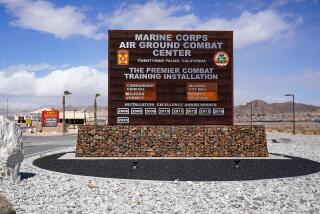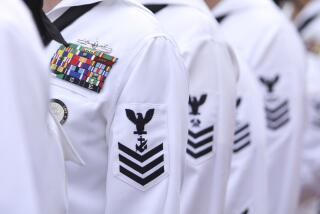Gave Federal Agencies Little Help in Breaking Big Espionage Cases : Navy Investigative Unit Has Reputation of Weakness
- Share via
While federal agencies were using undercover sting operations and telephone wiretaps to crack two of the most celebrated espionage cases in recent Navy history, the Naval Investigative Service was concentrating on its normal workload of probes into theft, narcotics abuse and homosexuality in the service.
The FBI broke the Walker family spy ring in May with little assistance from the NIS, even though Navy personnel were selling secrets to the Soviet Union. And for nearly two years the U.S. Customs Service did not inform NIS agents of its investigation of an international smuggling ring that stole sensitive Navy F-14 aircraft parts and shipped them to Iran.
“We knew that if we included the NIS, their investigators would run straight to their commanding officers and spill the beans,” said one federal source close to the case. “We didn’t want an admiral or commanding officer to know what was going on in his command and then go out and . . . sink the investigation.”
A Troubling Question
These cases have prompted high-ranking Navy officials in Washington to ask a troubling question: Where was the Navy investigative agency, which in addition to its more prosaic duties is also responsible for conducting counterespionage and counterintelligence operations?
The Naval Investigative Service dates back to the pre-1900s when civilian agents conducted surveillance from horse-drawn buggies. Today, the service is the only military investigative branch that still employs mostly civilians among its nearly 1,000 special agents.
Recently, the NIS has developed a reputation inside and outside military circles as a weak agency that does not aggressively pursue investigations, according to dozens of interviews with Navy officials, enlisted personnel and congressional sources.
NIS officials in Washington refused to be interviewed for this report. However, Roger Teel, deputy regional director for NIS operations in San Diego, said: “I don’t think honestly you can find a more professional organization. There are times we are stretched thin but by the same token we have been increasing our manpower. I think we’re staying up with it.”
Among the criticisms leveled at the agency:
--The NIS does not utilize undercover agents or sting operations often enough to infiltrate major espionage and theft rings operating on Navy ships and installations around the world.
Probe ‘Short-Circuited’
“The Iranian thing brought theft into our world pretty hard,” said one Navy captain in Washington. “We’ve got a responsive system that . . . didn’t assume there were traitors wanting to steal F-14 parts.” The goal now is “to create an environment wherein, if a ring is operating, people would be apprehensive that they were not talking to a ring member but an undercover agent,” he said.
--The NIS does not share the authority of its Army counterparts to independently pursue criminal investigations. For example, an NIS probe in 1983 of a vice admiral who kept 24 Soviet-made AK-47 rifles that were captured during the U.S. invasion of Grenada was “short-circuited” by high-ranking Navy officials, according to a House Armed Services Committee report.
Under the charter of the service, special agents are required to receive approval from a unit’s commanding officer before they can initiate an investigation. In the Grenada case, the commander-in-chief of the Atlantic Fleet ruled that no further investigations were necessary because Vice Adm. Joseph Metcalf had “accepted responsibility” for taking the weapons. Metcalf was reprimanded while several lower-ranking soldiers and Marines faced courts-martial.
“It is this approach by NIS that gives a bad odor to the Metcalf case,” Rep. Les Aspin (D-Wis.), chairman of the House Armed Services Committee, said recently. “While Metcalf had indeed accepted responsibility, the NIS never had the opportunity to establish just what Metcalf was responsible for.”
Weinberger Outraged
According to Navy officers, Secretary of Defense Caspar W. Weinberger reportedly became so outraged by the handling of the Metcalf case that he recently ordered new guidelines that allow NIS agents to appeal to the officer next in command if they believe an investigation was improperly squashed.
--Only one special agent usually is assigned to each of the Navy’s 13 deployable aircraft carriers, which carry crews of 5,000. The bulk of the criminal activity on carriers involves violence and narcotics use by sailors under the age of 20, Navy officials said. That leaves little time for one agent to investigate other crimes, including theft, fraud and waste.
“The man (aboard a carrier) probably lives the most miserable existence I can imagine,” said Al Deahl, a special agent of the investigative service for 27 years until he retired in 1980. “It’s an incredibly hard job. I don’t know when he sleeps.”
Agent Can Request Help
Lt. Stephen Pietropaoli, a Navy spokesman in Washington, said that NIS officials have no current plans to beef up their staffing on aircraft carriers. He said that the one NIS agent has the ship’s security force and master-at-arms force at his disposal and can request help from field agents.
--In some cases NIS agents have not aggressively pursued investigations. An investigator with the Navy’s master-at-arms force said he initiated numerous cases involving waste and theft on aircraft carriers that were turned down by NIS agents. Those cases included the disappearance of large amounts of gold from a Navy dental department and the tossing overboard of equipment such as air conditioners.
Two San Diego attorneys said they were “astounded” by the conduct of NIS agents when they arranged for Navy auditor Robert Jackson to discuss charges of widespread waste and fraud aboard the aircraft carrier Kitty Hawk.
“The Navy has berated, harassed and attempted to discredit my client,” said Randy Whaley, a Vietnam veteran who said one NIS agent lost valuable documents and tipped informants that Jackson had given their names to investigators. “They get results from coercion, not skilled investigative techniques.”
Rep. Bates Frustrated
Rep. Jim Bates (D-San Diego) said he was equally frustrated in his efforts to get the NIS interested in examples of fraud and waste. “I get the sense that they don’t know what they’re doing,” Bates said. “They seem to be more interested in covering up than uncovering information.”
But while the NIS gets low marks in some circles for its lackadaisical effort, others charge that Navy investigators use heavy-handed tactics to intimidate young sailors.
One Navy commander said he could not believe “the witch hunt” employed by NIS agents during a Florida homosexuality case. “They remind a lot of people around here of the KGB,” the commander said.
A Navy master-at-arms investigator said that during a recent three-year assignment on the aircraft carrier Ranger he watched with amazement whenever NIS agents interrogated sailors.
‘It Can Get Nasty’
“When you’re at sea for months with no military attorney on board and the NIS agent gets you in that little room, it can get nasty,” the investigator said. “I tried to look the other way sometimes. They’d threaten to ruin a sailor’s civilian life by putting information in his files that he was a thief.”
Navy officials do not plan any major overhaul of the NIS or the way agents conduct undercover operations, but some tinkering is already under way.
“We are going to reorder the priorities that govern the use of our investigative capacity,” Navy Secretary John F. Lehman Jr. said at a June 11 press conference. “We need to get on with changing the relative importance of things that we are investigating and put more attention to counterespionage.”
In an Aug. 12 press release, Navy officials in Washington announced a series of NIS policy changes that were “accelerated” in response to the recent espionage cases. Commodore Cathal L. Flynn was assigned last week to be commander of the NIS. Flynn becomes the first flag officer to head the NIS and report directly to the chief of naval operations.
Other changes expected soon include the transfer of 100 NIS employees to a new division that will exclusively process, approve and monitor security clearances for Navy personnel, a Navy spokesman said.
More to Read
Sign up for Essential California
The most important California stories and recommendations in your inbox every morning.
You may occasionally receive promotional content from the Los Angeles Times.













